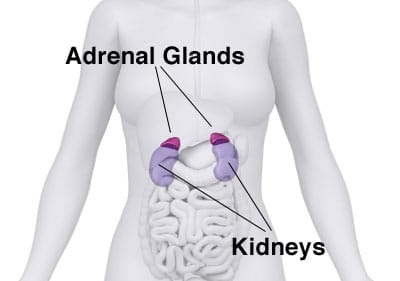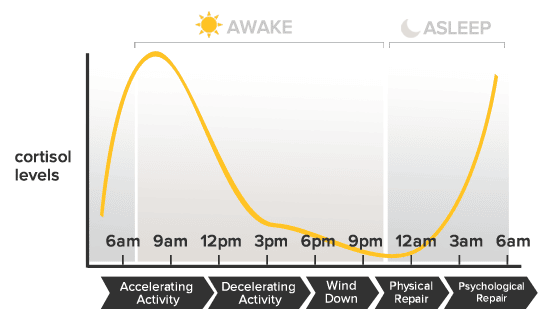This is Part 1 of an 8-part series about Adrenal Fatigue (HPA-Axis Dysregulation), how it relates to your health, how to know if it’s impacting you, and what you can do to fix it!
Last Sunday evening, I drove across town to meet up with a girlfriend. My husband Jacob and I had driven up the coast from our house in Santa Cruz, on highway 1, to go for a hike that morning. I had just gotten on the road to my friend’s house when I noticed my gas light was on. I drive a Honda Fit, and they never run out of gas. They get incredible mileage, so even when they are “out of gas”, you still have at least 20 miles.
On my way home, I was planning to stop to fill the tank, but decided I’d go first thing in the morning, and headed home instead. Big mistake.
The gas station is less than a mile from my house, but when I went the next morning, I was 100 yards away from it when my car….Slowly….Trudged…To..A. stop.
I was stuck in the middle lane during morning rush hour, people honking at me and yelling out their windows, with my hazard lights flashing, as I tried to push my car to the side of the road. How embarrassing! I haven’t done something like this since I was probably 16 years old!
It was another hour before I’d gotten my tank filled again and was on with my day, running late for my first appointment….sigh…
Not exactly how I wanted to spend my morning. As I rushed non-stop into my full schedule, I noticed that for the rest of the day I felt frazzled. Any capacity deal with an unexpected change of plans, or handle any conversation that required effort or patience went out the window. I wished that I’d had 10-minutes to meditate and re-center myself
When Jacob got home at the end of the day, he took one look at me and just laughed!
“Rough day, Babe?”
Luckily, after a warm bath, some gentle yoga, and a good night’s sleep, I woke up feeling refreshed and ready to charge Tuesday! But several years ago, when my adrenal hormones were on the fritz, a hectic day like Monday would have left me sleepless, exhausted, and stressed out for several days or more…..
It’s well established that all modern diseases and their symptoms are negatively impacted by chronic stress.
From PMS, to susceptibility to the common cold, to an increased tendency to develop chronic diseases like cancer and diabetes, stress clearly promotes the development and prevents healing of a multitude of health concerns.
If we feel stressed out all the time, the impact it has on our physiology can override the benefits that healthy nutrition and exercise provide to your body.
But what exactly is happening in your body when this occurs?
What Is Adrenal Fatigue?
There is a ton of misinformation about Adrenal Fatigue out there in Google-landia. Adrenal Fatigue is not a disease. It’s a syndrome that occurs as a consequence of chronic stress without relief, and is characterized by predictable symptoms like fatigue, poor mood swings, insulin resistance or low blood sugar swings, decreased sex drive, insomnia, increased susceptibility to colds and flus, and worsening PMS or menopausal symptoms. These are just a few of the signs that you might have imbalanced stress hormone levels.

Your adrenals are two small pyramid-shaped glands that sit on top of each of your kidneys. The adrenals are responsible for the production of several types of hormones—glucocorticoids, mineralocorticoids, and androgens. Cortisol, our main adrenal hormone, is made mostly in the adrenal cortex (some is also produced in the mitochondria of cells around the body). Cortisol is often referred to as our “stress hormone”—and it can get a bad rap. More aptly it could be called our “stress response” hormone—and, while we don’t want it to be super elevated for prolonged periods of time, it’s also not great for it to get overtly low.

In truth, cortisol (along with meltonin) is one of the primary hormones that establishes our circadian rhythm, or sleep and wake cycle, in response to cycles of light and darkness. We want cortisol to spike highest within the first 30 minutes of opening our eyes in the morning, and then to gradually taper off over the course of the day, hitting its lowest point in the evening when we naturally fall asleep.
We need a moderate amount of cortisol to circulate daily to maintain body tissues, provide energy, put out inflammation, and to serve other vital metabolic functions. When we get in to trouble is when we keep giving our body the message to pump out high levels all the time.
Chronically high cortisol leads to:
-Imbalanced female hormones
-Increased rates of depresssion
-Increased fat storage, especially spare tire, which is good if you are in a famine, in order to survive, but not good if you are trying to look good in that cute new bikini.
-Lower thyroid hormone function and production
-Overall tissue breakdown and poor repair of injuries
-Increased risk of heart attack and stroke
-Increased risk of cancer
-And those are just to name a few…
On labs, Adrenal Fatigue is characterized when the current level of hormones produced by your adrenal glands (like cortisol) are consistently above or below the optimal ranges, or, when the daily circadian rhythm is doing something other than it should be (like being high at night and low in the morning!).
But don’t be fooled. Just because it’s not a diagnosable “disease” doesn’t mean that it can’t have a profound effect on your wellbeing! In fact, Adrenal Fatigue is often an early-warning sign of increased vulnerability to a variety of diseases and conditions such as diabetes, depression, autoimmune disease, thyroid disorders, and more.
The good news is that Adrenal Fatigue is measurable and fixable!
A trained professional can guide you through diet and lifestyle improvements, along with the strategic use of supplement and herbal protocols, to help get you back on the path to wellness.
If you think you might have Adrenal fatigue, (also called “HPA-Axis Dysregulation”–but more about in the upcoming posts) let’s get on the phone and talk about it, so that I can support you!
Click Here for the next section in this series where we’ll talk about what it feels like to have imbalanced adrenal hormones.
At the Reverse-Age Method, we believe in a holistic approach to perimenopause and beyond, that addresses the root causes of your symptoms (like insomnia, hot flashes, night sweats, erratic periods, fatigue, skin aging, weight gain, and brain fog)– to also slow the pace that your cells are aging. Whether it’s improving gut health, optimizing detox function, enhancing mitochondrial function, or building muscle mass, our comprehensive program has got you covered.
If you’re new here, be sure to check out our Blog Page for more insights and tips on how to thrive during perimenopause. Our blog is packed with practical advice, success stories, and the latest research to help you on your journey.
For more updates and community support, follow us on social media:
You May Also Like...
Recipe: Grandma Fleischer’s Chopped Liver
Liver. You either love it or you hate it. Or you're too scared to find out. If you ask someone who grew up in a family…
Endometriosis 101 Part 2: How I Help My Patients Dealing with Endometriosis
Check out "Endometriosis 101 Part 1: What Is this Condition & Why Is it Happening to Me?" HERE While functional…
Whether you’re looking for help with your gut, your hormones, or both, our team of practitioners work together to treat the WHOLE you – guiding you to a healthier mind, body, and spirit day by day.



